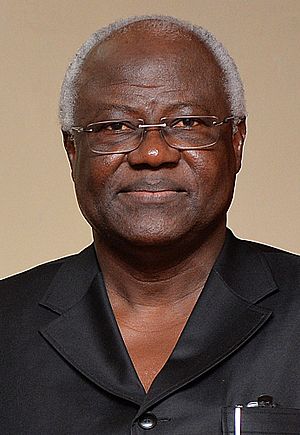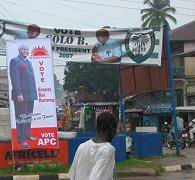Ernest Bai Koroma facts for kids
Quick facts for kids
Ernest Bai Koroma
|
|
|---|---|

Koroma in 2015
|
|
| 4th President of Sierra Leone | |
| In office 17 September 2007 – 4 April 2018 |
|
| Vice President | Samuel Sam-Sumana (2007–2015) Victor Bockarie Foh (2015–2018) |
| Preceded by | Ahmad Tejan Kabbah |
| Succeeded by | Julius Maada Bio |
| Leader of the All People's Congress | |
| Assumed office 24 March 2002 |
|
| Secretary-General | Osman Foday Yansaneh |
| Preceded by | Edward Turay |
| Minority Leader of Parliament | |
| In office 2005–2007 |
|
| Preceded by | Edward Turay |
| Succeeded by | Emmanuel Tommy |
| Personal details | |
| Born | 2 October 1953 Makeni, British Sierra Leone |
| Political party | All People's Congress |
| Spouse |
|
| Children | Alice Dankay Yunis |
| Alma mater | Fourah Bay College |
| Religion | Christianity (Wesleyan) |
| Website | Government website |
Ernest Bai Koroma (born October 2, 1953) is a politician from Sierra Leone. He was the fourth President of Sierra Leone, serving from September 17, 2007, to April 4, 2018.
Koroma was born and grew up in Makeni, a city in northern Sierra Leone. Before he got into politics, he worked in the private insurance business for over 24 years. From 1988 to 2002, he was the head of a company called the Reliance Insurance Trust Corporation (Ritcorp).
He went to Fourah Bay College and earned a bachelor's degree in 1976. By trade, he is an insurance agent.
In 2002, Koroma became the leader of the All People's Congress (APC), which was the main opposition party in Sierra Leone at the time. He ran for president in 2002 but lost to the president at the time, Ahmad Tejan Kabbah.
After the election, Koroma was elected to the Parliament, where he represented his home district of Bombali from 2002 to 2007. In 2005, he became the minority leader in Parliament, a role he held until he was elected president.
In the 2007 presidential election, Koroma won with 54.6% of the vote. He defeated Solomon Berewa, who was the Vice-President. Koroma was sworn in as president on September 17, 2007. Both local and international groups said the election was free and fair.
In 2012, Koroma was re-elected for a second term as president. He won with 58.7% of the vote, beating his main opponent, Julius Maada Bio. After Koroma finished his second term, Julius Maada Bio won the next election in 2018 and became the new president.
Contents
Early Life and Schooling
Ernest Bai Koroma was born on October 2, 1953, in Makeni, Bombali District. This was in the Northern Province of what was then British Sierra Leone. He grew up in a Christian family. His family was part of the Temne ethnic group, and he speaks the Temne and Limba languages fluently.
His father, Sylvanus Koroma, worked as a teacher at a bible school in Makeni. His mother, Alice Koroma, was also a teacher and was active in local politics. She was a member of the All People's Congress (APC) party and served on the Makeni city council.
Koroma went to primary school in Makeni. For high school, he attended the Magburaka Government Secondary School for Boys. After graduating in 1973, he moved to the capital city, Freetown, to study at Fourah Bay College. He graduated in 1976 with a degree in Business Management. After college, he worked as a teacher for two years.
Career and Family
In 1978, Koroma started working for the Sierra Leone National Insurance Company. Later, he joined the Reliance Insurance Trust Corporation (Ritcorp). In 1988, he became the managing director of Ritcorp and stayed in that job for 14 years.
Koroma is married to Sia Nyama Koroma. They got married in 1986. Sia Koroma is a biochemist and a psychiatric nurse. Together, they have two daughters, Alice and Dankay, and one son, Yunis.
Political Journey
Becoming Leader of the APC
In 2002, the All People's Congress (APC) party needed a new leader to run for president. Koroma, who was not well-known at the time, decided to run for the party's leadership. He was seen as an underdog against the longtime leader, Edward Turay.
Koroma argued that the party needed a new direction to win back the trust of the people. At a national meeting of the party on March 24, 2002, Koroma was elected as the new leader of the APC.
Running for President
In the 2002 presidential election, Koroma ran as the APC candidate. He received 22.3% of the vote and lost to President Ahmed Tejan Kabbah, who won with 70.3%. After the election, Koroma was elected as a member of Parliament for his home district.
There were some legal challenges to his leadership of the APC. However, in 2005, he was re-elected as the party's leader and presidential candidate for the 2007 election.
The 2007 Election
Koroma ran for president again in the August 2007 general election. His main opponent was Solomon Berewa, the Vice-President at the time.
In the first round of voting, Koroma got 44.3% of the votes, while Berewa got 38.3%. Since no one got more than 50%, a second round of voting was held.
On September 17, the National Electoral Commission announced that Koroma had won the second round with 54.6% of the vote. He was sworn in as president on the same day.
Presidency of Sierra Leone
First Term and Goals
Koroma was officially inaugurated as president on November 15, 2007. At the ceremony, he promised to fight corruption and change people's attitudes about it. He said he wanted to "run Sierra Leone like a business" and focus on farming and tourism to help the economy.
His goals included:
- Rebuilding the country's roads and buildings after the Civil War.
- Fighting corruption and the misuse of the country's resources.
- Improving the healthcare system.
- Providing electricity to all parts of Sierra Leone.
In April 2010, Koroma signed a law that made healthcare free for pregnant women, nursing mothers, and children under five.
Fighting Corruption
On September 4, 2008, Koroma signed a new Anti-Corruption Bill into law. This law required the president and other government officials to declare their assets every year. This means they had to publicly list everything they owned.
The country's anti-corruption commission was given more power to investigate and prosecute officials. During his time as president, several government ministers were dismissed because of corruption.
Second Term and Challenges
Koroma was re-elected in 2012. His government continued to focus on building roads and encouraging investment, especially in the mining industry.
However, his presidency also faced major challenges. These included high levels of poverty, unemployment, and poor housing. While the government made some improvements, critics said that more needed to be done.
President Koroma remained popular, especially in the northern and western parts of Sierra Leone. His team of ministers included people from many of Sierra Leone's different ethnic groups. He often made surprise visits to poor neighborhoods to see how people were living.
See also
 In Spanish: Ernest Bai Koroma para niños
In Spanish: Ernest Bai Koroma para niños
 | Audre Lorde |
 | John Berry Meachum |
 | Ferdinand Lee Barnett |


